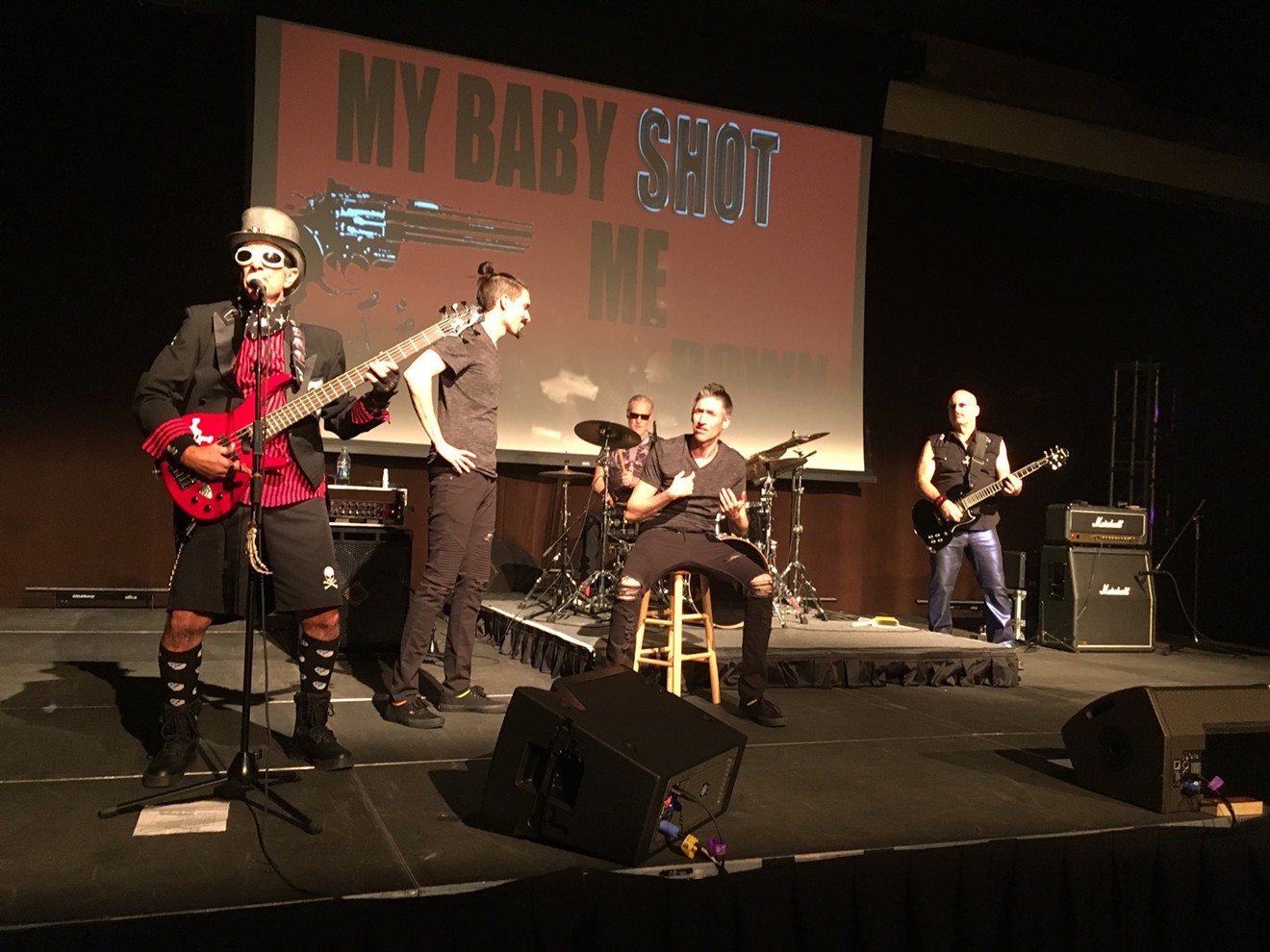They've been touring the United States and Europe together for 47 years — about as long as the Eagles. Their fans casually compare their longevity and importance to the Rolling Stones. Yet when the three members of Beethoven’s Nightmare finished their searing set at Ellie Caulkins Opera House on Friday night, there was barely an audible sound from the audience.
That’s because Beethoven’s Nightmare is deaf, along with most of its inspiring, enthusiastic fan base. The band's name refers not to rock music being Beethoven’s nightmare, but to the classical-music genius’s living nightmare of becoming deaf in his thirties.
Though the description “the world’s first and only deaf rock band” is untrue — there is a growing community of deaf rock bands, deaf rappers and a lot more — Beethoven’s Nightmare is perhaps the most well known of all time. The group’s devoted fans showed up en masse at its Denver gig on Friday, waving their raised hands wildly in the air (the sign for applause) as the trio took the stage, along with young twin brothers who performed the lyrics in American Sign Language as Beethoven's Nightmare played. For the band’s fans, it was an important cultural arts experience; for the uninitiated, it was a revelation.
Walking up to Will Call and feeling like the only person among hundreds of concert-goers who wasn’t fluent in ASL felt awkward, as did trying to mingle among a raucous and excited, but silent, crowd. But it was refreshing when a fan flashed me the heavy metal “sign of the horns” in the elevator; that's language I know. Attending a packed concert where everyone is excited to see a band I’ve never heard before is not new to me, but attending a concert where I might be the only audience member who can hear?
In this refreshing world of opposites, the woman who came on stage to introduce Beethoven’s Nightmare signed, while the ASL interpreter stood off stage. During the group’s self-titled first song, a man in front of me who realized I not only wasn’t deaf but also didn’t know sign language got my attention, looked deeply into my eyes and started rocking out, to make sure I was having a good time. This might happen at a cult band’s show, such as Phish, if it became obvious that it was someone’s first time, but it was especially poignant here, because it was also obvious that the members of Beethoven’s Nightmare kept rhythm and tempo together most effectively when they similarly stared at each other and rocked out.
“Subwoofers are a big thing at deaf concerts,” a woman who works with ImaginASL Performing Arts told me before the show. Reverberation (in other words, feeling the music) is paramount to the audience and the band, so guitarist Steve Longo, for instance, plays ridiculously loud and very, very bassy. It was the second-loudest concert I’ve ever attended, behind only a Toots and the Maytals show I saw as a kid.
Other than Chuck Berry’s “Roll Over Beethoven,” Beethoven’s Nightmare played all originals during its Denver set, most of them visceral, simple and muscular rock songs with names like “I Wanna Feel the Beat,” “Deaf Rock Boom” and “Turn It Up Louder.” Although Longo and singer/bassist Ed Chevy, who met at Gallaudet University (a Washington, D.C., school designed to be barrier-free for deaf students.), told me through an interpreter after the show that their first concerts (both in California) were the Who and the Beatles, Beethoven’s Nightmare plays music closer to primitive ’70s English punk than ’60s English rock.
Chevy explained to me that the biggest influence the Who had on him, a deaf kid from an all-deaf family, was the action: the windmill guitar, the cosmically and comically physical drumming and, more than anything, watching the the band's members destroy their instruments on stage.
Drummer Bob Hilterman became deaf at age four after a bout with meningitis, and told me he overcame the shame and trauma of growing up in a non-deaf family of classical musicians, who urged him to stay away from music. As a young man, he attended a Native American drumming ceremony which inspired him to explore music. Hilterman told me his other revelation was putting his head centimeters away from a turntable playing Little Richard’s “Good Golly, Miss Molly” to feel rock and roll, which he says changed his life.
The liberation and camaraderie between the musicians and the audience members was fascinating. Sure, Beethoven’s Nightmare fans take selfies during the show, get drunk and distract others with mid-show chatter like most concert-goers, but it’s just…different. So is the valuable and necessary discomfort of seeing Beethoven’s Nightmare as a non-deaf music lover.
Imagine being a deaf person who loves music and attends a rock show. There’s usually no accommodation. No one on stage signing. No bartender or box-office employee who knows ASL. Presumably no effective way to chat up a cute concert-goer standing next to you. And Beethoven’s Nightmare fans — not to mention the band and the concert organizers — could have been just as unaccommodating to me at Ellie Caulkins, refusing to serve me a beer or grant an interview, let alone take time to explain the world of deaf music, if I didn’t know ASL.
“Deaf people are very social,” Beethoven’s Nightmare’s non-deaf manager said to me after the show, as I waited to meet with all three original members. But the crowd appeared no different from regular rock fans, lining up to compliment and connect with the band; they just had to, for example, shake a hand in front of a fellow fan to have their turn rather than boisterously chat their way into the conversation. At one point, a large group of deaf fans rushed the stage as Hilterman prepared to throw a drumstick into the crowd; when the stick fell, it was the only sound.
Guitarist Longo, dressed like a member of Black Sabbath, balked when I asked whether Beethoven’s Nightmare has ever had the intention of making sure deaf people can have a great rock-concert experience.
“Not really,” he said. “We love music. We did it for the music.”
“I grew up in a deaf family,” Chevy added. “Mom, dad, brother, sister, all deaf. My mother was a dancer, a deaf flamenco dancer. My dad was an artist, a performer. Deaf [people] can’t hear, but they can feel the beat. My mother taught me rhythm, beat. No rhythm, no life.”
“No music, no life!” Hilterman concluded.
CRITIC'S NOTEBOOK: Longo followed up with the writer via email to say, "When asked whether Beethoven’s Nightmare has ever had the intention of making sure deaf people can have a great rock-concert experience, I meant to say many came saying it was their first experience being able thoroughly enjoy music with ASL performance, so that was our intention."
[
{
"name": "Air - MediumRectangle - Inline Content - Mobile Display Size",
"component": "12017618",
"insertPoint": "2",
"requiredCountToDisplay": "2"
},{
"name": "Editor Picks",
"component": "17242653",
"insertPoint": "4",
"requiredCountToDisplay": "1"
},{
"name": "Inline Links",
"component": "18838239",
"insertPoint": "8th",
"startingPoint": 8,
"requiredCountToDisplay": "7",
"maxInsertions": 25
},{
"name": "Air - MediumRectangle - Combo - Inline Content",
"component": "17261320",
"insertPoint": "8th",
"startingPoint": 8,
"requiredCountToDisplay": "7",
"maxInsertions": 25
},{
"name": "Inline Links",
"component": "18838239",
"insertPoint": "8th",
"startingPoint": 12,
"requiredCountToDisplay": "11",
"maxInsertions": 25
},{
"name": "Air - Leaderboard Tower - Combo - Inline Content",
"component": "17261321",
"insertPoint": "8th",
"startingPoint": 12,
"requiredCountToDisplay": "11",
"maxInsertions": 25
}
]












